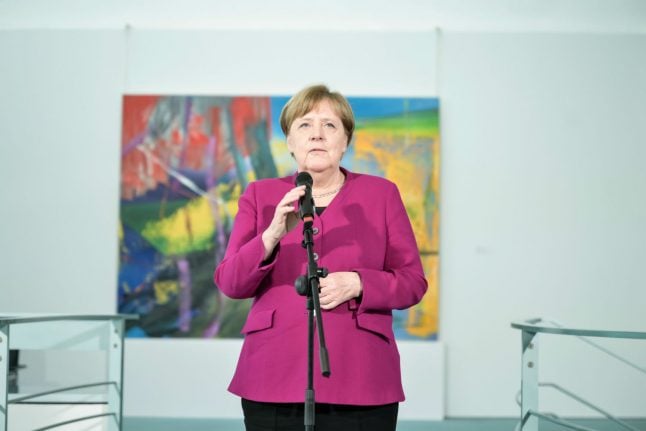Merkel said she was informed that over the holiday weekend many people were not adhering to the restrictions, for example by not wearing face masks in supermarkets, as is now required around Germany, reported DPA.
READ ALSO: Merkel 'greatly concerned' as public life in Germany starts to reopen
In the newest phase of the pandemic, “despite all the relaxation, we really do have the certainty that people will adhere to the Grundgebote (basic commandments),” said Merkel on Monday after a video conference with representatives of the Health Department in the Harz Mountains.
“So keep your distance, and wear mouth and nose protection. Respect each other,” said Merkel.
“This is very important.”
Merkel’s words followed weekend protests which broke out in Berlin, Frankfurt, Dortmund and several other German cities. An estimated 10,000 people attended a rally in Stuttgart, while 3,000 attended a demonstration in Munich to protest the restrictions.
Many fear that such illegal gatherings – as well as a growing number of people in Germany turning a blind eye to regulations – would cause a rebound in the coronavirus reproduction number.
The Robert Koch Institute for public health said Germany's closely watched reproduction rate (R0) had climbed to 1.1, meaning 10 people with COVID-19 infected on average 11 others.
As recently as Wednesday, Germany's number stood at 0.65. But since then the country has reported clusters of new cases at slaughterhouses and at care homes for the elderly.
READ ALSO: Rise in coronavirus infections spurs concern across Germany
Merkel continued say that only in two to three weeks will it be known how the relaxation of the corona restrictions decided on during the previous week will affect the total number of infections.
'A central role'
The Chancellor also thanked the Harz health department on behalf of all health departments in Germany for their work.
“The public health service has been given a central role in the fight against the pandemic,” she said. They will help decide “whether we can really trace all contacts in newly infected people”.
Saxony-Anhalt's Prime Minister Reiner Haseloff and District Administrator Martin Skiebe (both CDU) had also joined the conference.
The Harz health department had been faced with a special challenge when the coronavirus had broken out in the central contact point for asylum seekers in Halberstadt.
More than 120 people became infected. The communal accommodation was under quarantine until the beginning of May.



 Please whitelist us to continue reading.
Please whitelist us to continue reading.
Member comments